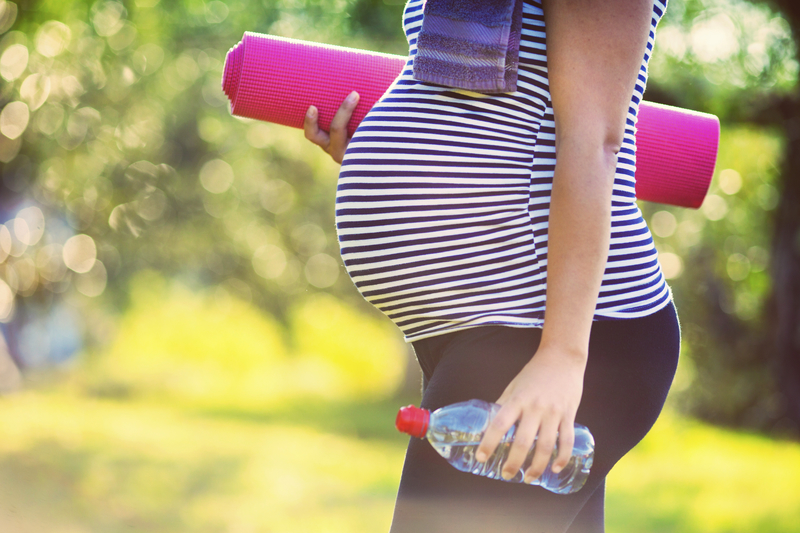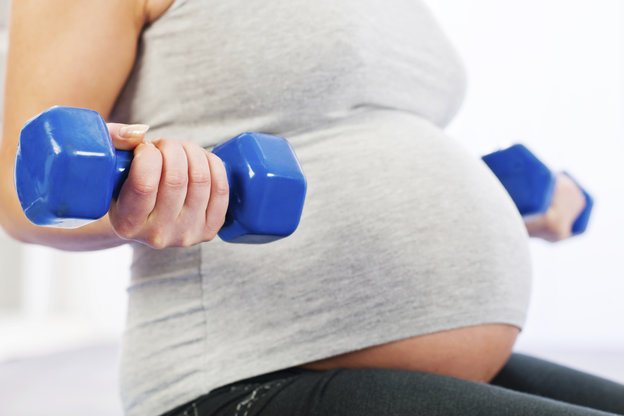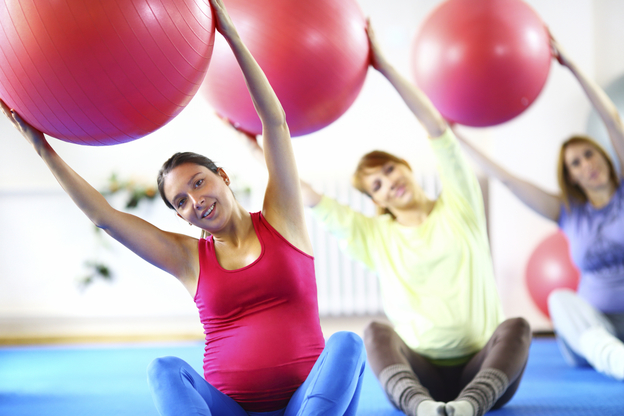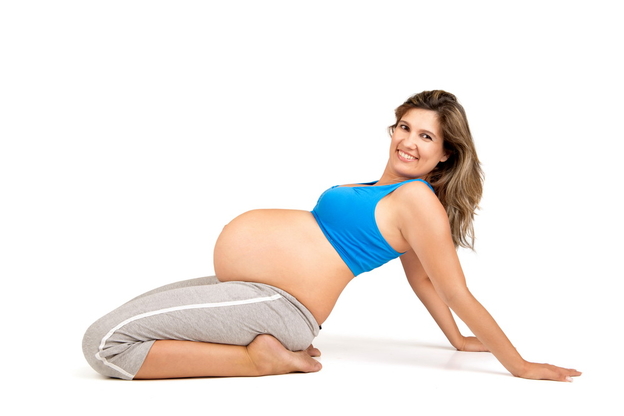SingaporeMotherhood | Pregnancy
February 2016
Should You Exercise During Your Pregnancy?

It seems that when a woman gets pregnant, the general public opinion is that she should cut back on her exercise. Perhaps this is due to the perception that pregnant mothers shouldn’t over-exert themselves, exercise included. The truth is, exercise is just as important as nutrition and rest for your baby’s growth. However, people may still frown upon it because of traditional beliefs that may not be backed by science.
With increased medical research, we are now able to monitor and understand our pregnancies better than the older generations did. Prenatal tests and ultrasound scans give us a clear idea of how our pregnancy is progressing month after month, and this knowledge empowers us to make the right choices, including choosing exercises that benefit both mummy and baby the most.
[banner][/banner]
The “Exercise is Evil” Myth
Perhaps the biggest reason why people feel that a pregnant woman should abstain from exercise is because she is accountable for another life growing inside her. What if she pushes her limits during exercise and something happens to the hapless foetus?
Some of the common layman concerns regarding exercise during pregnancy include:
- miscarriage, especially in the first trimester when foetal implantation may still be unstable
- an increased risk of falling, as the mother may be thrown off balance by the extra weight
- oxygen deprivation for the baby during exercise
- a rise in mum-to-be’s body temperature during exercise causing discomfort to the baby
Should You Quit Exercising When Pregnant?
Is totally quitting exercise the answer? Not at all, unless directed by your obgyn. Anyone who is physically inactive for a long period of time suffers from inevitable health problems such as high blood pressure and diabetes, to name a few.
Those health problems, coupled with the physical burden of carrying a baby to term, would be a lot to bear for a pregnant woman. In fact, they can be completely avoided with simple exercise. You can enjoy a smooth and trouble-free pregnancy. All it takes is some awareness and some simple changes to the way you exercise.
Make Simple Changes to Your Pregnancy Exercise Regime
The hormone relaxin loosens muscles and ligaments in preparation for childbirth. Due to this, jerking movements such as star jumps and burpees may cause damage to your joints. In fact, as your pregnancy progresses, you may naturally find these movements harder to do. The added pressure on the back muscles to accommodate a ballooning baby bump will also inhibit you from performing more flexible movements. Therefore, it’s a good idea to modify your exercises accordingly, such as eliminating jumping movements for the duration of your pregnancy.
As someone who leads a moderately active lifestyle and enjoys high intensity workouts (my recommended way to lose bulge fast!) before pregnancy, I tried to maintain a moderate level of activity to cope with the stress of a new pregnancy. However, my parents-in-law started protesting, worrying that exercise might increase the chances of a miscarriage or affect the baby’s health even though I had cut out jumping and other high-intensity movements.
To err on the side of caution, I took their advice and reduced the amount of exercise I did. But here’s the thing – my body started having aches and pains, the kind that athletes have after turning sedentary. Now it was my body’s turn to protest!
I’m Confused. Should I or Should I Not Exercise During Pregnancy?
On one hand, I’m not keen to clash with older folks, but on the other hand, my body was clearly telling me otherwise. I felt so sore all over and so helpless about it that I was throwing tantrums at my poor hubby.
Thankfully, Dr Anthony Siow, Obstetrician and Gynaecologist with Gleneagles Hospital Singapore, put my worries to rest: “Exercise is definitely beneficial during pregnancy.”
According to Dr Siow, pregnant mothers who exercise stand to enjoy all these benefits:
- Exercise promotes good muscle tone and strength, which contributes to less backache and a better posture
- It improves your mood, increases your energy level and helps you sleep better
- Exercise has also been shown to reduce constipation, bloating and swelling
In that case, are my parents-in-law’s concerns valid at all?
“In a normal pregnancy, exercise has not been shown to cause miscarriage. The concerns of overheating and oxygen deprivation may hold true only if exercise is done in excessively high intensity, like that of training for a marathon.”
Dr Siow adds, “Exercise in pregnancy need not be strenuous to be beneficial. A session of 15 to 30 minutes of brisk walking, low-impact aerobics, stationary cycling or swimming, three times a week can make a positive difference to your pregnancy.”
Great Exercises for Pregnant Mamas!
Low-impact cardio exercises are generally safe for pregnant women. They are easier on the joints and reduce the risk of injury while still giving your heart a good workout.
• brisk walking
• swimming
• aqua aerobics
• stationary bicycling
• dance (select those tailored to pregnant women)
• belly dancing
• the cross-trainer, elliptical machine and rowing machine in the gym are also great indoor alternatives
Avoid The Following Exercises
Certainly, with a baby on board, mothers need to be extra careful when it comes to exercise. Dr Siow advises pregnant mums to avoid exercises that involve contact sports like basketball or volleyball.
“They should also avoid exercises that have a risk of falling like skiing and horseback riding. If they have medical conditions like low blood count, uncontrolled blood pressure, poorly controlled diabetes or severe obesity, it would be best to consult their doctor before beginning an exercise program as exercise may be risky in such conditions. If there is a past history of cervical incompetence, present history of low placenta or growth restriction of the baby, exercise may pose more risk than benefits.”
Exercise During Pregnancy? The Conclusion.
From what I have learnt, there are two parties you should listen to when it comes to exercise during pregnancy:
1. Your doctor
Rather than listening to old wives’ tales or ignorant hearsay, seek sound medical advice from your gynae. He or she is professionally trained and will be familiar with your medical history since he or she is monitoring your pregnancy.
2. Your own body
As for how much is too much, I find it informative to take cues from your body because everyone’s threshold is different. Remember when my body started aching when I cut out exercise during my first trimester? Similarly, use cues to know when to moderate your workouts.
Exercise should make you feel good and ease that pregnancy backache, not leave you all sore and exhausted. Make sure you are able to still hold a conversation while exercising, commonly referred to as the ‘talk test’. If you find yourself breathless, experiencing sharp pains or excessive post-workout soreness, that’s probably a sign you’re working out too hard.
Remember, we are doing this for the sake of both our health and our pregnancy. Exercise has a direct positive impact on baby’s healthy development as well. I have heard of mums who never exercised during their pregnancy, but I can’t imagine the impact on their health. Not exercising is detrimental to anyone’s health, even more so during pregnancy, and there is simply no way one can stay healthy during pregnancy without any exercise. Fit mother = fit baby!
All content from this article, including images, cannot be reproduced without credits or written permission from SingaporeMotherhood.
Follow us on Facebook, Instagram, and Telegram for the latest article and promotion updates.









